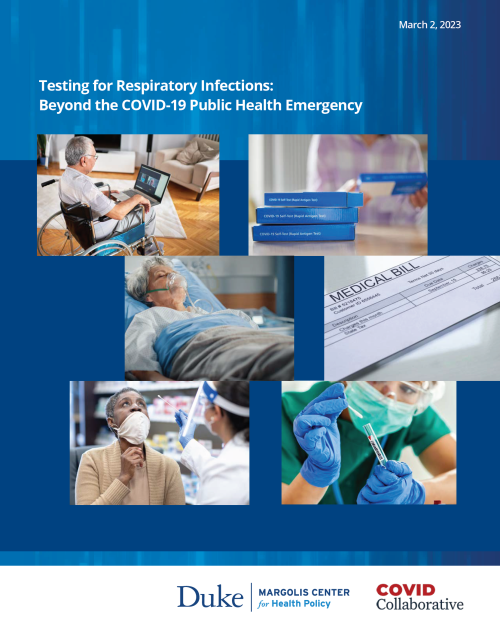Press Release
New Recommendations Chart a Path Forward for Respiratory Infection Testing after End of PHE


For Immediate Release
March 2, 2023
New Recommendations Chart a Path Forward for Respiratory Infection Testing after End of PHE
Plan Includes Engaging the Public, Ensuring Affordable Access to OTC Testing, and
Reducing Testing Costs
Washington, DC—The end of the COVID-19 Public Health Emergency (PHE) on May 11, 2023 will impact Americans’ free access to tests and diminish people’s ability to access early testing and prevent infectious disease spread, note authors of a new Duke-Margolis and COVID Collaborative report, “Testing for Respiratory Infections: Beyond the COVID-19 Public Health Emergency.” The authors issue a set of recommendations to embed low-cost testing for those that need it most into national health policy and payment strategies to ensure that these diagnostic tools are accessible to the public long-term.
“Recent progress in diagnostic testing for respiratory viruses has created powerful and effective tools to help people protect themselves and their loved ones while living their lives, but we are not yet on a course to take advantage of these advances,” said Mark McClellan, director of the Duke-Margolis Center for Health Policy. “There are some clear steps that the Federal government, including Medicare and Medicaid, as well as health care organizations can take outside of any public health emergency to make access and use of testing easier and routine—and prevent hospitalizations and deaths.”
The report sets out policy steps to support practical information, availability, affordability, and equitable access to innovative and convenient tests for respiratory infections to empower Americans and protect the most vulnerable, by supporting them in making better informed decisions in their daily lives to protect themselves and their loved ones and take action to get treated if needed. The recommended approaches avoid substantial restrictions, extraordinary measures, or large new government appropriations.
“Testing empowers Americans to safeguard their own health and those around them. The goal is to create a stable market and availability of testing over the long term so that people can respond when they have respiratory symptoms,” said John Bridgeland, Co-Founder and CEO of the COVID Collaborative. “Key to ensuring public engagement and support of testing post-PHE starts with clear, straightforward communication on testing recommendations, and ensuring clinicians and community and public health workers have access to the supporting evidence for those recommendations. This guidance should include concise, practical information that can be used by community leaders to inform the public and answer questions about when to test and how to act on the results.”
The nation needs a strategy in place, ideally before the end of the public health emergency, to leverage testing to support people in their ability to make personal choices in terms of protecting themselves, and those most vulnerable in the communities, from respiratory viruses, the authors note. Further, this plan should aim to avoid the health and access inequities made evident through the COVID-19 pandemic. Continued public funding for accessible over-the-counter (OTC) testing is important for individuals who would not otherwise have easy access to COVID-19 tests. For example, offering uninsured Americans (approximately 30 million people) six free tests per year, purchased in bulk by the federal government and distributed through the mail, could likely be accomplished for under $6 per test delivered.
“After the PHE, many people will be faced with paying for COVID-19 tests for the first time,” said Gary Edson, President of COVID Collaborative. “This will decrease willingness to test, even for people at high risk, and will result in continued reductions in manufacturing, leaving the United States once again without enough tests to face any new surges.”
The report addresses these and other key issues, including payment, summarized in the chart below:

###
Contact: Patricia Green, Duke-Margolis
Patricia.s.green@duke.edu; 301.520.6482
About Duke-Margolis
The mission of the Robert J. Margolis, MD, Center for Health Policy at Duke University is to improve health, health equity, and the value of health care through practical, innovative, and evidence-based policy solutions. For more information, visit healthpolicy.duke.edu and follow us on Twitter @DukeMargolis.
About COVID Collaborative
The COVID Collaborative is a national bipartisan assembly of experts, leaders and institutions in health, education and the economy, and associations representing the diversity of the country, united to turn the tide on the pandemic by supporting global, federal, state, and local COVID-19 response efforts. COVID Collaborative includes former FDA commissioners, CDC directors, and U.S. surgeon generals; former U.S. secretaries of Education, Defense, Homeland Security, and Health and Human Services; leading public health experts and institutions that span the country; leading business groups and CEOs; major global philanthropies; and associations representing those on the frontlines of public health and education. For more information, visit: www.covidcollaborative.us.
